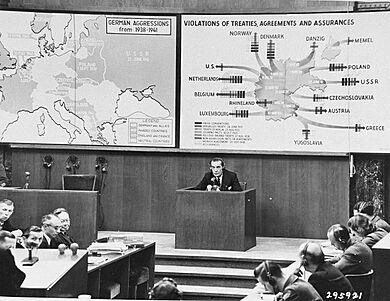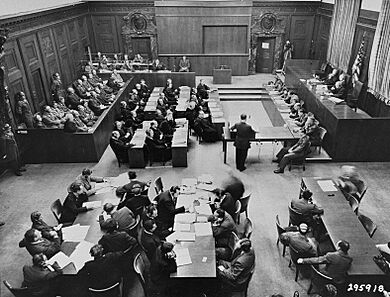Ministries Trial facts for kids
The Ministries Trial was one of the important trials held in Nuremberg, Germany, after World War II. The United States authorities organized these trials in their part of Germany. There were twelve such trials in total, and they all took place in the same building, the Palace of Justice, where the main International Military Tribunal had also been held. These twelve trials are often called the "Subsequent Nuremberg Trials".
This specific trial was also known as the Wilhelmstrasse Trial. This name came from a street in Berlin called Wilhelmstrasse, where important German government offices, like the Foreign Ministry, were located. The people on trial were officials from various government departments during Nazi Germany. They faced charges for their roles in the terrible actions committed in Germany and other countries during the war.
Contents
Who Were the Judges and Prosecutors?
The judges for this trial were William C. Christianson from Minnesota, Robert F. Maguire from Oregon, and Leon W. Powers from Iowa. The main lawyer for the prosecution, who presented the case against the defendants, was Robert Kempner. The entire trial lasted a very long time. It started on January 6, 1948, and ended on November 18, 1948. The judges announced their decision on April 11, 1949, and the sentences were given out on April 13, 1949.
This was the longest of all the twelve trials. Out of 21 people who were put on trial, two were found not guilty. Eighteen others were found guilty of at least one accusation and received prison sentences. These sentences ranged from three years to 25 years. One person, Ernst Wilhelm Bohle, admitted he was guilty, which was unusual for these trials.
What Were the Accusations?
The people on trial faced several serious accusations. These included:
- Planning and starting aggressive wars.
- Mistreating prisoners of war.
- Committing terrible acts against civilians, both in Germany and in countries that Germany had taken over.
- Stealing valuable things and resources from occupied territories.
- Forcing people from concentration camps and occupied countries to work as slaves.
- Being a member of a criminal organization, such as the Nazi Party or the SS.
Some of the initial accusations were later dropped during the trial.
Who Were the People on Trial?
Here are some of the important people who were on trial and what happened to them:
| Name | Photo | Role | Outcome |
|---|---|---|---|
| Ernst von Weizsäcker |  |
A high-ranking official in the German Foreign Ministry, later an ambassador. | Sentenced to 7 years, later reduced to 5 years. Released in October 1950. |
| Gustav Adolf Steengracht von Moyland |  |
Also a Secretary of State in the Foreign Ministry. | Sentenced to 7 years, later reduced to 5 years. Released in January 1950. |
| Wilhelm Keppler |  |
An advisor to Adolf Hitler on economic matters. | Sentenced to 10 years. Released in February 1951. |
| Ernst Wilhelm Bohle |  |
A Nazi Party leader and Secretary of State in the Foreign Ministry. | Admitted guilt and was sentenced to 5 years. Released in December 1949. |
| Ernst Wörmann | A Secretary in the Foreign Ministry. | Sentenced to 7 years, later reduced to 5 years. Released in January 1950. | |
| Karl Ritter | Connected the Foreign Office with the German armed forces. | Sentenced to 4 years. Released after the judgment. | |
| Otto von Erdmannsdorff | A Secretary in the Foreign Ministry. | Found not guilty. | |
| Edmund Veesenmayer |  |
A special representative in Hungary. | Sentenced to 20 years, later reduced to 10 years. Released in December 1951. |
| Hans Heinrich Lammers |  |
Head of the German government's main office. | Sentenced to 20 years, later reduced to 10 years. Released in December 1951. |
| Wilhelm Stuckart |  |
Secretary of State in the Interior Ministry. | Sentenced to time already served (3 years and 10 months). |
| Richard Walther Darré |  |
Minister for Food and Agriculture. | Sentenced to 7 years. Released in August 1950. |
| Otto Meissner |  |
Head of the Presidential Office. | Found not guilty. |
| Otto Dietrich |  |
Chief of Press for the Nazi Party. | Sentenced to 7 years. Released in 1950. |
| Gottlob Berger |  |
A high-ranking SS officer. | Sentenced to 25 years, later reduced to 10 years. Released in December 1951. |
| Walter Schellenberg |  |
A top leader in the German secret services. | Sentenced to 6 years. Released in December 1950. |
| Lutz Graf Schwerin von Krosigk |  |
Minister of Finance, and briefly a leading minister after Hitler's death. | Sentenced to 10 years. Released in February 1951. |
| Emil Puhl |  |
Vice-president of the German central bank. | Sentenced to 5 years. Released in December 1949. |
| Paul Körner |  |
A Secretary of State and assistant to Hermann Göring. | Sentenced to 15 years, later reduced to 10 years. Released in December 1951. |
| Paul Pleiger | Head of large steel plants that used forced labor. | Sentenced to 15 years, later reduced to 10 years. Released in December 1951. | |
| Hans Kehrl |  |
Secretary in the Ministry of Armament. | Sentenced to 15 years. Released in February 1951. |
| Karl Rasche |  |
A director of a major German bank. | Sentenced to 7 years. Released in August 1950. |
After this trial, Wilhelm Stuckart faced another court in 1950. He was fined for his involvement with the Nazi Party.
Another person who was supposed to be on trial, Herbert Backe, who was a former minister, died before the trial began.
See also
 In Spanish: Juicio de los Ministerios para niños
In Spanish: Juicio de los Ministerios para niños
 | Kyle Baker |
 | Joseph Yoakum |
 | Laura Wheeler Waring |
 | Henry Ossawa Tanner |



